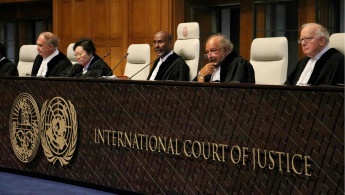UN court rules US must partially halt Iran sanctions
The UN's top court handed down the judgement after Iran asked it to halt economic measures that Trump reimposed after pulling out the landmark 2015 nuclear accord that was signed under his predecessor Barack Obama.
Judges in The Hague ruled that the sanctions on some goods breached a 1955 "friendship treaty" between Iran and the US that was penned before the 1979 revolution that deposed the US-backed and authoritarian Shah of Iran.
"The court finds unanimously that... the United States of America... shall remove by means of its choosing any impediments arising from the measures announced on 8 May to the free exportation to Iran of medicines and medical devices, food and agricultural commodities," said chief judge Abdulqawi Ahmed Yusuf.
The court said sanctions on goods "required for humanitarian needs... may have a serious detrimental impact on the health and lives of individuals on the territory of Iran".
Twitter Post
|
US sanctions also had the "potential to endanger civil aviation safety in Iran and the lives of its users".
Trump slapped a first round of sanctions on Iran in August after pulling out in May of the international deal aimed at curbing Tehran's nuclear ambitions, to the dismay of his European allies. A second round of punitive measures targeting Iran's oil sector is due in November.
The ICJ rules on disputes between UN member states. Its decisions are binding and cannot be appealed, but it has no mechanism to enforce them.
Trump's "America First" foreign policy largely rejects overarching international organisations.
In August, Washington forcefully told the court that it has no jurisdiction to rule on this case as it concerns a matter of national security.
Wednesday's ruling is in fact a decision on so-called provisional measures ahead of a final decision on the matter, which may take several more years, experts said.
The case is the second brought by Tehran against Washington since 2016. That year it brought a suit at the ICJ against the freezing of around $2 billion of Iranian assets abroad which US courts say should go to American victims of terror attacks.
Hearings in that case are due to start next week.
The US and Iran have not had official diplomatic relations since 1980, despite their 1955 Treaty of Amity and Economic Relations.





 Follow the Middle East's top stories in English at The New Arab on Google News
Follow the Middle East's top stories in English at The New Arab on Google News
![The UAE is widely suspected of arming the RSF militia [Getty]](/sites/default/files/styles/image_330x185/public/2024-11/GettyImages-472529908.jpg?h=69f2b9d0&itok=Yauw3YTG)
![Netanyahu furiously denounced the ICC [Getty]](/sites/default/files/styles/image_330x185/public/2024-11/GettyImages-2169352575.jpg?h=199d8c1f&itok=-vRiruf5)
![Both Hamas and the Palestinian Authority welcomed the ICC arrest warrants [Getty]](/sites/default/files/styles/image_330x185/public/2024-11/GettyImages-2178351173.jpg?h=199d8c1f&itok=TV858iVg)